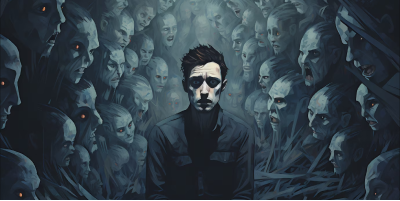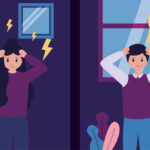Understanding Major Depressive Disorder (MDD):

Major Depressive Disorder (MDD) is a common and serious mental health condition that affects how an individual feels, thinks, and handles daily activities. According to the Diagnostic and Statistical Manual of Mental Disorders, Fifth Edition (DSM-5), MDD is defined by a set of specific criteria that must be met for a formal diagnosis. Aaron Beck postulated a cognitive triad of depression that consists of – (1) Views about the self – a negative self-perception, (2) About the environment – a tendency to experience the world as hostile and demanding, (3) About the future – the expectation of suffering and failure.
Diagnostic Criteria for Major Depressive Disorder (MDD)
The clinical diagnosis of MDD requires the presence of five or more symptoms over a continuous period of at least two weeks. These symptoms must indicate a change in the individual’s normal functioning, with at least one of the core symptoms being either a depressed mood or a loss of interest or pleasure in activities (anhedonia).
Core Symptoms:
- Depressed Mood: This is one of the hallmark features of MDD and involves feelings of sadness, emptiness, or hopelessness that persist most of the day, nearly every day. In some cases, especially in children and adolescents, this mood may present as irritability rather than sadness. The duration and intensity of this mood can vary but must be present for the majority of the day.
- Marked Diminished Interest or Pleasure: The loss of interest or pleasure in most or all activities, even those that were previously enjoyable, is another core symptom. This phenomenon, known as anhedonia, is often described by patients as a loss of motivation or satisfaction in activities such as hobbies, social interactions, or professional endeavors.
Additional Symptoms:
In addition to these core features, other symptoms may include changes in weight, sleep patterns, psychomotor activity, energy levels, feelings of worthlessness or guilt, concentration difficulties, and suicidal thoughts. These additional criteria allow clinicians to capture the full scope of the disorder’s impact on both the mind and body.
- Weight Changes: Significant weight loss or weight gain—defined as a change of more than 5% of body weight within a month—can indicate changes in appetite associated with depression. Some individuals may experience a marked increase in appetite, while others may lose interest in food entirely.
-
Sleep Disturbances: Insomnia or hypersomnia (excessive sleeping) are common in individuals with MDD. Insomnia may manifest as difficulty falling asleep, staying asleep, or waking up too early, while hypersomnia involves excessive daytime sleeping and difficulties in waking up.
-
Psychomotor Changes: Some individuals may show either psychomotor agitation or retardation. Psychomotor agitation refers to a sense of restlessness, such as pacing or fidgeting, while psychomotor retardation presents as slowed movements and speech, often noticeable to others.
-
Fatigue or Loss of Energy: A pervasive sense of exhaustion, even without physical exertion, is a common symptom of MDD. Individuals often report feeling drained and unable to perform even routine activities.
-
Feelings of Worthlessness or Guilt: Excessive or inappropriate guilt, often unrelated to actual circumstances, can occur. Individuals may dwell on perceived failures, missteps, or worthlessness, magnifying their negative emotions and thoughts.
-
Difficulty Concentrating: Depression can impair cognitive functions, making it difficult to focus, think clearly, or make decisions. Individuals often report that their minds feel foggy, and they struggle to complete tasks at work or school.
-
Suicidal Thoughts or Plans: Perhaps the most concerning symptom, thoughts of death, suicidal ideation, or attempts at suicide, must be taken seriously. These thoughts may range from passive wishing for death to active planning or attempts to end one’s life.
- The Role of Distress and Impairment: For a diagnosis of MDD, the symptoms must cause clinically significant distress or impairment in social, occupational, or other important areas of functioning. This requirement underscores that MDD is not just a collection of isolated symptoms but a disorder that disrupts daily life. Individuals with MDD often struggle to maintain their normal routines, relationships, or job responsibilities, as the symptoms interfere with functioning on multiple levels. The disruption in functioning can manifest in a variety of ways. Socially, individuals may withdraw from friends and family, feeling isolated or disconnected. At work, they may struggle to concentrate, meet deadlines, or engage with colleagues, leading to poor performance or even job loss. The effects on personal relationships can be profound, as the depressive symptoms may strain even the closest bonds.
The symptoms must not be attributable to the physiological effects of a substance (e.g., drugs, alcohol) or another medical condition. This criterion is crucial in ensuring that the symptoms of depression are not being masked by other factors. Conditions such as hypothyroidism, Parkinson’s disease, or the side effects of certain medications can mimic depressive symptoms. Therefore, a comprehensive medical evaluation is necessary to rule out other causes.
The Exclusion of Other Psychiatric Disorders:
MDD must also be distinguished from other psychiatric disorders that might present with similar symptoms. For example, bipolar disorder, characterized by alternating periods of depression and mania, may be initially mistaken for MDD. To avoid this, clinicians must carefully evaluate the individual’s history and symptomatology to ensure that the symptoms are not better explained by a different disorder. If a person has experienced manic or hypomanic episodes, they would be diagnosed with bipolar disorder rather than MDD.
The final criterion states that there should be no history of manic or hypomanic episodes. This criterion is critical in differentiating MDD from bipolar disorder. While both conditions involve depressive episodes, the presence of mania or hypomania distinguishes bipolar disorder from MDD. This diagnostic clarity is essential because the treatment approaches for MDD and bipolar disorder differ significantly.
The Clinical Significance of MDD:
Major Depressive Disorder is not simply a temporary feeling of sadness or a rough patch; it is a serious mental health condition that can have profound effects on every aspect of an individual’s life. Left untreated, it can lead to significant emotional and physical health complications. The impact of MDD extends beyond the individual, affecting families, workplaces, and broader social systems.
Comorbidities and Complexities:
MDD frequently coexists with other mental health disorders, such as anxiety, substance use disorders, and personality disorders. The presence of these comorbid conditions can complicate the diagnosis and treatment of depression, as each condition may require distinct therapeutic approaches. In some cases, physical illnesses like chronic pain or cardiovascular diseases may coexist with depression, creating a complex interaction between mental and physical health.
Implications for Treatment:
Once a diagnosis of MDD is established, treatment typically involves a combination of psychotherapy, medication, and lifestyle interventions. Cognitive-behavioral therapy (CBT) is one of the most effective psychotherapeutic approaches, helping individuals challenge negative thought patterns and develop healthier coping mechanisms. Medications, such as antidepressants (SSRIs, SNRIs, or atypical antidepressants), are often prescribed to regulate mood and alleviate symptoms. In more severe cases, electroconvulsive therapy (ECT) may be considered when other treatments have failed.
Beyond clinical interventions, the support of friends, family, and a stable social network is essential for individuals with MDD. Regular monitoring and follow-up care are important to assess the effectiveness of treatments and prevent relapse, as MDD has a recurrent nature in many individuals.





Comments (0)